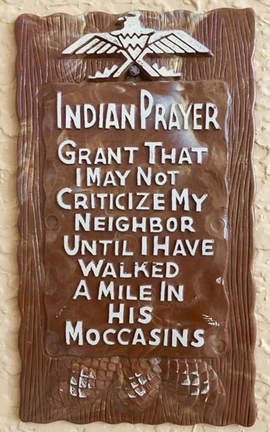 The house I lived in from age 9 to 19 was not a happy place. A lot of terrible things happened to me there. But hanging on the door of the room where my dad kept his records, instruments and trophies was a humble glimmer of enlightenment. It was a cheap, small, plastic sign my dad had put there. I’m not sure where he got it, but I think it came from St. Joseph’s Indian School. Regardless, it had a Native design on it, and a quote that I grew up reading and ultimately incorporating into the way I now try to live my life. It read: “INDIAN PRAYER: Grant that I may not criticize my neighbor until I have walked a mile in his moccasins.” I acquired one of these little plastic signs myself somewhere along the way, and it now hangs in my house right inside my front door. There are a lot of heated words flying around right now about statues, flags, anthems and patriotism. And it is tempting to jump into the fray with what, to me, seem like inarguable facts. But I have quietly watched and listened as others have attempted to articulate these undeniable truths, only to find that their words fall on deaf ears and invoke more emotionally charged, nonsensical rebuttals. Thus, I have taken time to contemplate and reflect on what the deeper issue is here, and now realize why logical explanation is futile: deep seated prejudice that causes an inability and/or unwillingness to truly listen. Facts don’t matter when we are angry, and truth is inconsequential when we refuse to consider another perspective than our own. Those who have little to no personal or ancestral history with oppression can find it difficult to empathize with those who have. Add a dash of prejudice to that, and it becomes nearly impossible. One cannot consider the view of a person who belongs to a group they have collectively prejudged with the broad brushstroke of racism and stereotypes, which means any chance for a logical, unbiased dialogue is usually hopeless. So how do we, as human beings, free ourselves from this quagmire? The answer is simple, but obviously not easy or we would have already done it. In the Broadway musical ‘The Will Rogers Follies’, the Cherokee philosopher, writer and entertainer says, “Y’see, an Indian always looks back after he passes something so he can get a view of it from both sides. A white man don’t do that – he just figures that all sides of a thing are automatically the same. That’s why you must never judge a man while you’re facing him. You’ve got to go around behind him like an Indian and look at what he’s looking at. Then go back and face him and you’ll have a totally different idea of who he is. You’d be surprised how much easier it is to get along with everybody.” I beg to differ with Will on one thing. I believe all people have the ability to look at both sides. The question is whether we choose to or not. The current rancor over statues and the national anthem is missing the point; or worse, trying to change the subject. Because the point and the subject has always been about the fact that oppressed, marginalized peoples have been – and are still being – mistreated by mainstream American society. As I said, the remedy is simple. It’s called empathy. It means to feel the pain of another, to listen and hear their truth, and to share and be involved in healing the hurt and brokenness. In order to do that, it requires us to choose respect over prejudice, inclusion over division, open-mindedness over bigotry, humility over arrogance, truth over propaganda, empathy over apathy, and love over hate. And yes, those are all things we choose, which means the power rests with each of us. So take time to reflect before you make that choice. Because until we stop being distracted by the smoke and mirrors diversion that wants us to argue about statues, flags and anthems, we will never address the very real issue that people from all walks of life are peacefully and legally standing up and taking a knee for – racial injustice in America. All people, no matter their ethnic background, just want to be heard, included, treated fairly, and understood. That is definitely not happening right now. Because it can only happen when America can learn to live by the credo on the humble, plastic sign that hangs by my front door: “Grant that I may not criticize my neighbor until I have walked a mile in his moccasins.”
10 Comments
|
CategoryAll Native Life Tipi Talks Wisdom For Life AuthorJohn Two-Hawks - Grammy nominated Native American Flute Music Recording Artist, author, activist and speaker. FULL BIO Archives
|
 RSS Feed
RSS Feed
